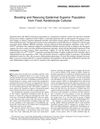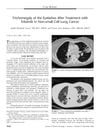15 citations,
January 2022 in “Immune Network/Immune network” New targeted immunotherapies are improving treatment for inflammatory skin diseases.
 15 citations,
December 2020 in “Pharmacology Research & Perspectives”
15 citations,
December 2020 in “Pharmacology Research & Perspectives” Blocking enzymes that help the virus enter cells could be a promising way to treat COVID-19.
 15 citations,
August 2020 in “American Journal of Pathology”
15 citations,
August 2020 in “American Journal of Pathology” Insulin helps heal corneal wounds and nerves in diabetic mice by activating the Wnt signaling pathway.
15 citations,
June 2019 in “Biochemical Journal” A new genetic disorder caused by an ODC1 mutation can be treated with DFMO.
 15 citations,
February 2017 in “Nursing Clinics of North America”
15 citations,
February 2017 in “Nursing Clinics of North America” Targeted cancer therapies can cause skin side effects, which should be treated early to help patients' quality of life and treatment adherence.
 15 citations,
August 2016 in “Current Urology Reports”
15 citations,
August 2016 in “Current Urology Reports” Nandrolone and oxandrolone could help treat male health issues like muscle loss and low testosterone.
 15 citations,
November 2015 in “Pharmacopsychiatry”
15 citations,
November 2015 in “Pharmacopsychiatry” α-Blockers and 5-ARIs for BPH can cause sexual dysfunction, including erectile and ejaculatory issues.
 15 citations,
December 2014 in “Dermatology and therapy”
15 citations,
December 2014 in “Dermatology and therapy” Sorafenib can cause facial acne-like eruptions, which improve after reducing the dose or stopping the drug.
15 citations,
October 2014 in “The journal of investigative dermatology/Journal of investigative dermatology” Erlotinib causes skin inflammation through IL-1, which can be reduced by anakinra.
 15 citations,
August 2013 in “Stem Cells and Development”
15 citations,
August 2013 in “Stem Cells and Development” The method increases stem-like cells for better skin regeneration.
 15 citations,
April 2003 in “Journal of Dermatological Science”
15 citations,
April 2003 in “Journal of Dermatological Science” Gene differences may affect baldness treatment response in Korean men.
 15 citations,
January 2020 in “Experimental Dermatology”
15 citations,
January 2020 in “Experimental Dermatology” The document concludes that understanding and treatments for alopecia areata have significantly advanced, now recognizing it as an autoimmune disorder.
 14 citations,
February 2021 in “Journal of the European Academy of Dermatology and Venereology”
14 citations,
February 2021 in “Journal of the European Academy of Dermatology and Venereology” A COVID-19 patient with severe hair loss did not improve with hair loss medication after stopping and restarting it due to the infection.
 14 citations,
April 2019 in “International Journal of Women's Health”
14 citations,
April 2019 in “International Journal of Women's Health” Some treatments can stabilize Frontal Fibrosing Alopecia, but more research is needed to find effective treatments, and hair transplants often fail.
 14 citations,
April 2017 in “American Journal of Transplantation”
14 citations,
April 2017 in “American Journal of Transplantation” Skin problems from transplant drugs are common and need careful management in organ transplant patients.
 14 citations,
September 2015 in “Expert Opinion on Therapeutic Targets”
14 citations,
September 2015 in “Expert Opinion on Therapeutic Targets” The conclusion is that while oral contraceptive pills are effective for PCOS-related high androgen levels, new treatments with fewer side effects are needed.
 14 citations,
November 2006 in “Current Medicinal Chemistry”
14 citations,
November 2006 in “Current Medicinal Chemistry” New treatments for enlarged prostate are being developed to be more effective and have fewer side effects.
13 citations,
December 2021 in “Wound repair and regeneration” Photobiomodulation helps hair regrow in injured skin by aiding cell movement and secretion.
 13 citations,
February 2019 in “Journal of the American Academy of Dermatology”
13 citations,
February 2019 in “Journal of the American Academy of Dermatology” The document concludes that a new system using the SALT score should replace the current alopecia areata classification for better accuracy in assessing severity and prognosis.
 13 citations,
February 2016 in “Clinical Medicine”
13 citations,
February 2016 in “Clinical Medicine” The document concludes that diagnosing and treating hair loss is complex and requires understanding its psychological effects and underlying causes, while also calling for more research and new treatments.
12 citations,
May 2015 in “Journal of the National Comprehensive Cancer Network” Doctors should actively prevent and treat skin side effects in cancer patients to keep them on the best medication and reduce discomfort.
 12 citations,
November 2006 in “Journal of thoracic oncology”
12 citations,
November 2006 in “Journal of thoracic oncology” A cancer patient's eyelashes grew excessively without other common side effects after taking the cancer drug erlotinib.
12 citations,
October 2013 in “British Journal of Dermatology” The meeting concluded with optimism about increasing research and better management of vitiligo.
 11 citations,
August 2020 in “Diabetes”
11 citations,
August 2020 in “Diabetes” Testosterone helps human pancreatic cells increase insulin release.
 11 citations,
November 2019 in “Clinical Case Reports”
11 citations,
November 2019 in “Clinical Case Reports” A Brazilian teenager with severe hair loss had total hair regrowth with no side effects after using tofacitinib.
 11 citations,
November 2019 in “Journal of the American Academy of Dermatology”
11 citations,
November 2019 in “Journal of the American Academy of Dermatology” Oral tofacitinib is a promising treatment for beard hair loss in alopecia areata.
 11 citations,
November 2018 in “Journal of the American Academy of Dermatology”
11 citations,
November 2018 in “Journal of the American Academy of Dermatology” Tofacitinib therapy can effectively regrow eyebrows and eyelashes in some alopecia areata patients.
11 citations,
April 2018 in “Epilepsy research” Letrozole reduces seizures but not brain damage in mice.
 11 citations,
February 2016 in “Current Medicinal Chemistry”
11 citations,
February 2016 in “Current Medicinal Chemistry” New treatments for prostate cancer and BPH show promise, including novel compounds that target hormone synthesis and response.
 11 citations,
September 2014 in “International Journal of Molecular Sciences”
11 citations,
September 2014 in “International Journal of Molecular Sciences” Mycophenolate helps reverse hair loss effects caused by IFN-γ by activating a key hair growth pathway.






















